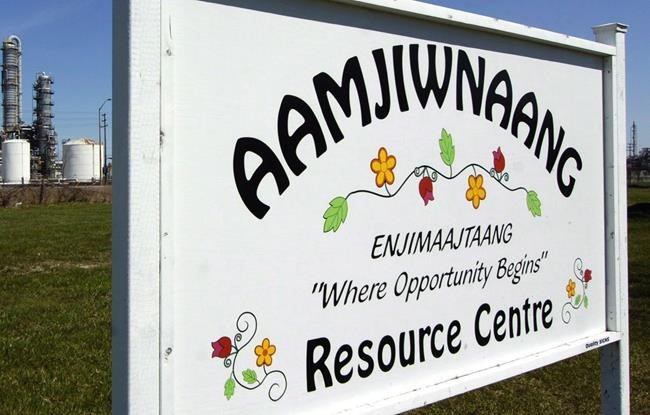TORONTO — Ontario's Ministry of the Environment has ordered a petrochemical facility in Sarnia to suspend its production operations after high benzene emissions, first flagged by a neighbouring First Nation.
Aamjiwnaang First Nation, which is surrounded by industrial facilities and monitors air quality readings, recently said citizens fell ill and there were high emissions of the cancer-causing substance from Ineos Styrolution.
The company said in a statement Tuesday that its own monitors didn't detect any emissions outside prescribed limits, but that it temporarily shut down to perform maintenance and address a mechanical issue.
But the ministry said Wednesday evening that "despite several previous provincial orders requiring the company to reduce benzene emissions, recent readings at this site continue to be above acceptable levels."
"Today, the decision was made to suspend Ineos Styrolution’s Environmental Compliance Approval," the ministry wrote in a statement.
"This action will ensure the facility, currently shut down for maintenance, fully addresses the causes and sources of emissions."
The facility must meet certain conditions, including suspending production operations at the facility, removing all benzene storage from the site, repairing leaky equipment, installing full vapour control on vessels containing benzene, and implementing a comprehensive benzene monitoring and community notification plan.
"We will continue to closely monitor the company’s progress with meeting the requirements of the provincial orders, as well as actions required by the amended ECA," the ministry wrote.
"The company will be required to complete these actions and submit a startup plan to the ministry for review before they can resume their normal operations."
Ineos did not immediately respond to a request for comment Wednesday evening, but said in its statement the previous day that it constantly monitors air quality with five state-of-the-art monitors on-site and would send alerts if there were any emissions outside the approved range.
"We have reviewed all data for the period concerned and we can confirm that our monitors recorded no emissions outside our prescribed limits," the company wrote.
"We can confirm that no one on our site has reported feeling unwell and our site continues to be a safe place to work for our employees and contractors. We hope this will be of further reassurance to our neighbours."
Members of the Aamjiwnaang First Nation have long advocated for stronger monitoring and more stringent regulations, saying they have high rates of asthma, headaches, learning and behavioural problems in children, and miscarriages.
The Ineos factory makes styrene for use in making plastics including Styrofoam containers and trays and foam packing pellets. Styrene is made from benzene, a petrochemical extracted mainly from crude oil.
Ontario had just last week issued a compliance order to Ineos, requiring it to develop a plan to prevent, reduce and eliminate wastewater discharge of benzene. It was also ordered to implement procedures to notify the public when benzene concentrations in the air exceed certain thresholds, and to take action to prevent, decrease and eliminate other sources of benzene discharge.
This report by The Canadian Press was first published May 1, 2024.
Allison Jones, The Canadian Press

